 My friend, Sam Riviera, wrote this about how he spent Easter:
My friend, Sam Riviera, wrote this about how he spent Easter:
Amazing grace,
How sweet the sound.
That saved a wretch like me
I once was lost,
But now am found.
Was blind,
But now I see.
We spent Easter morning with the outcast — the lame, the halt, the thieves, the alcoholics, the drug-addicts, the murderers. We climbed out of our warm beds and headed out into the streets laden with bags of clothes, food and water. We shared what we had with those who had slept under bushes, on the ground and any other place they could find.
Happy Easter! Happy Easter! Almost every person greeted us with “Happy Easter!”
These are supposed to be the people who don’t know Jesus. Yet they know Jesus. They have seen Jesus walking among them. He has danced with them. He loves them. They like Jesus.
Jesus was with them in prison. He visited them there. He was with them in Southeastern Asia when they spent the years rotting away in bamboo cages lowered into holes. He was with them as they walked the streets of America, looking for a place to lay their head. They told us Jesus was with them.
“Grace. It’s all about grace. No matter had bad we screw up, God’s grace is still good. He never forgets us. He’s always there. He’s always been there for me. He’s been there the last eighteen years while I’ve traveled around the country. I don’t have a dime to my name, but I’ve got God’s grace. It’s all about grace. Don’t ever forget that.”
So said the man sitting on the sidewalk on Easter morning. The man with no home. The man with nothing. But he knows that Jesus lives!
“See this mark behind my ear,” said another. That’s where the VC shot me. The bullet came out through my nose. See this big white patch on my thigh” he said, pulling up his pant leg. “That’s where they got the skin to graft onto the left side of my face. Another bullet ripped a big hole there and they had to patch it. God got me through it and He’ll get you through whatever comes your way too.”
We went to give a cup of water, a warm coat. We found Easter. The risen Jesus had been there. The risen Jesus was there, walking among those outcast and despised by the world. He too had been outcast and despised. He knows what it’s like. He walks among those He loves. They see Him. They see the One who was despised, rejected and afflicted. He is one of them.
He is risen!
He is risen indeed!
He walks among His people.
He loves us. Whether we’re thieves, adulterers, liars, cheats, gluttons, alcoholics or murderers, He loves us.
Whether we see Him in a fancy building with stained glass windows or dancing with us in the streets, He’s there. He’s alive.
If you haven’t seen Him, walk with those who do see Him. Perhaps you’ll catch a glimpse. Perhaps He’ll come and sit with you. Perhaps He’ll dance with you.
There is so much need in the world!
And YOU can help.
Fill out the form below to receive several emails about how to love and serve the poor and homeless.
(Note: If you are a member of RedeemingGod.com, login and then revisit this page to update your membership.)





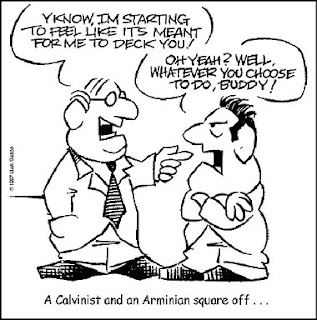 I once preached a sermon on predestination and election, and there was a Calvinistic man in the church who, right in the middle of my sermon, stood up, and loudly said to his family, “Come on. We’re leaving!” He and his family filed out of their row, out the back of the church, and never returned. I later called him to find out why he left, and he accused me of being a heretic.
I once preached a sermon on predestination and election, and there was a Calvinistic man in the church who, right in the middle of my sermon, stood up, and loudly said to his family, “Come on. We’re leaving!” He and his family filed out of their row, out the back of the church, and never returned. I later called him to find out why he left, and he accused me of being a heretic.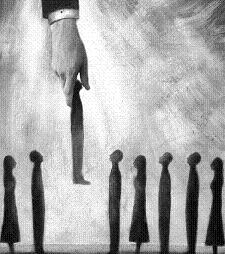 I believe that predestination does not refer to God’s choice of which people get to go to heaven, but refers instead to God’s determination to bring into glory all those who receive eternal life by faith in Jesus. In other words, predestination teaches us about who gets glorified, not who gets justified.
I believe that predestination does not refer to God’s choice of which people get to go to heaven, but refers instead to God’s determination to bring into glory all those who receive eternal life by faith in Jesus. In other words, predestination teaches us about who gets glorified, not who gets justified. 

 This interpretation of the cross makes God once again the violent perpetrator of this most violent of crimes. According to this view, God ordained the death of His Son because God demands the blood sacrifice of an innocent victim to appease His anger toward sin.
This interpretation of the cross makes God once again the violent perpetrator of this most violent of crimes. According to this view, God ordained the death of His Son because God demands the blood sacrifice of an innocent victim to appease His anger toward sin.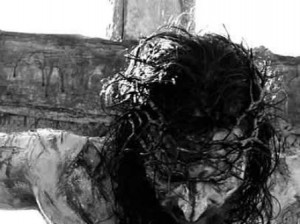 On the cross, Jesus removed the veil from the power of sin.
On the cross, Jesus removed the veil from the power of sin. How can a God who says "Love your enemies" (Matthew 5:44) be the same God who instructs His people in the Old Testament to kill their enemies?
How can a God who says "Love your enemies" (Matthew 5:44) be the same God who instructs His people in the Old Testament to kill their enemies?


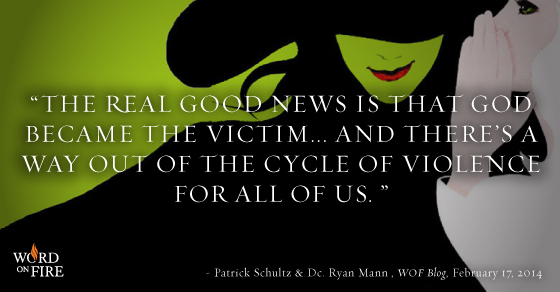

 Throughout history and around the world, people have noticed that violence permeates everything. From birth to death, from galaxies down to sub-atomic particles, violence is omnipresent. Whenever people recognize this, they are left with only two basic options for the existence and origin of violence.
Throughout history and around the world, people have noticed that violence permeates everything. From birth to death, from galaxies down to sub-atomic particles, violence is omnipresent. Whenever people recognize this, they are left with only two basic options for the existence and origin of violence.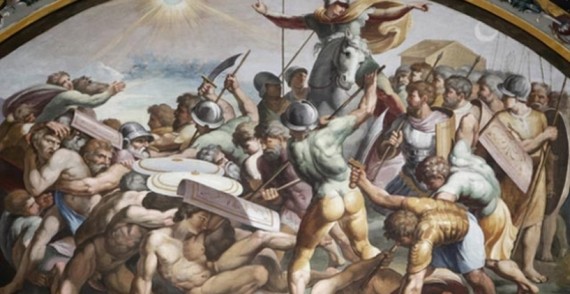

 A reader recently sent in a question about whether or not she could lose her salvation. I searched my blog high and low for somewhere that I had answered this before, and much to my shock, could not find that I had previously written about this anywhere. I am certain I have written about it, but since I couldn’t find it, decided to write about it anyway. Here is the question she sent in:
A reader recently sent in a question about whether or not she could lose her salvation. I searched my blog high and low for somewhere that I had answered this before, and much to my shock, could not find that I had previously written about this anywhere. I am certain I have written about it, but since I couldn’t find it, decided to write about it anyway. Here is the question she sent in: Well, if you are asking, “Can a Christian lose eternal life?” the answer is no. If everlasting life can be lost, it has the wrong name. Besides, Jesus promises everlasting life to all who simply and only believe in Him for it (John 3:16; 5:24; 6:47), and if we believe that everlasting life is not everlasting, then we are doubting the words and promises of Jesus.
Well, if you are asking, “Can a Christian lose eternal life?” the answer is no. If everlasting life can be lost, it has the wrong name. Besides, Jesus promises everlasting life to all who simply and only believe in Him for it (John 3:16; 5:24; 6:47), and if we believe that everlasting life is not everlasting, then we are doubting the words and promises of Jesus.
 I tend to write my books on my blog. I do this for various reasons, one of which is that I desire input, questions, and suggestions from readers. The following posts are from my book When God Pled Guilty, which is an examination of how to understand the violent actions of God in the Old Testament in light of Jesus Christ, and especially, Jesus Christ dying for His enemies on the cross.
I tend to write my books on my blog. I do this for various reasons, one of which is that I desire input, questions, and suggestions from readers. The following posts are from my book When God Pled Guilty, which is an examination of how to understand the violent actions of God in the Old Testament in light of Jesus Christ, and especially, Jesus Christ dying for His enemies on the cross.
 The basic idea behind soul sleep is that when a person dies, they do not immediately go to heaven to be with God, but enter into a state of unconscious limbo. They are no longer alive, but they are not in heaven either. They are not conscious of being dead, but they have not ceased to exist. Instead, they are “asleep.”
The basic idea behind soul sleep is that when a person dies, they do not immediately go to heaven to be with God, but enter into a state of unconscious limbo. They are no longer alive, but they are not in heaven either. They are not conscious of being dead, but they have not ceased to exist. Instead, they are “asleep.” 
 In
In  Up until the crucifixion of Jesus, and even in the minds of most today, humanity believed the essential lie of the devil, that if someone was attacking you, you attack back. If someone was threatening you, you strike first and strike hard.
Up until the crucifixion of Jesus, and even in the minds of most today, humanity believed the essential lie of the devil, that if someone was attacking you, you attack back. If someone was threatening you, you strike first and strike hard.